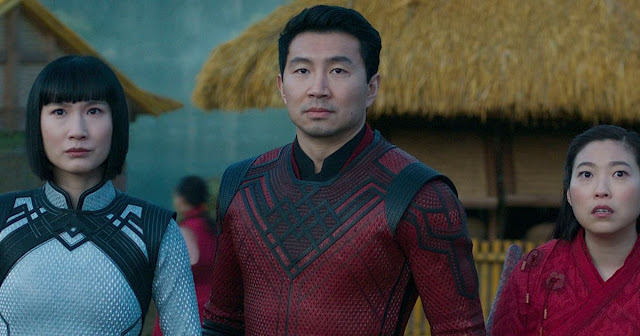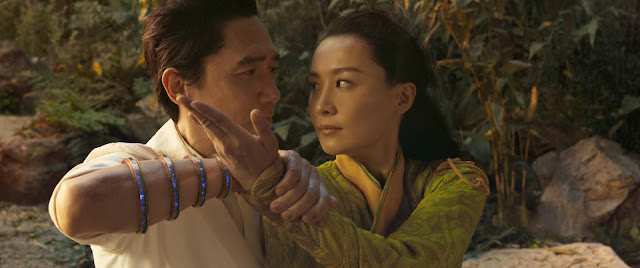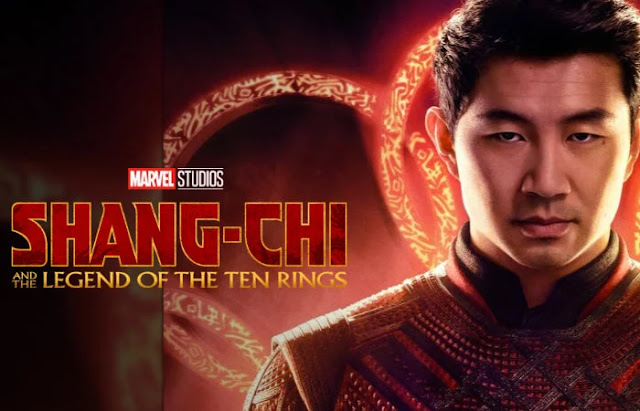Shang-Chi had an intriguing history as a character in the Marvel Comic Universe, he was originally introduced in 1973 as the son of Fu Manchu, you know, the racist literary/film character that originated from the 1910s through a series of novels which trafficked in “Yellow Peril”, or the racist fear that asian cultures presented an existential danger to Americans. When Marvel lost the rights to his original literary father, his history was then revamped with his old man now being Zheng Zu, a powerful sorcerer. To add another troubling layer to his origin story, Shang-Chi, a martial arts master, was created to capitalize on the Kung Fu TV show phenomenon. You know the one that notoriously cast David Carradine, instead of Bruce Lee as the proverb spouting Kung Fu master? When Marvel couldn’t obtain the rights from Warner Brothers to make a comic adaptation of the show, they created their own character to capitalize on the craze and based it somewhat loosely on Lee.
We can even dig in a bit into the MCU today, which had its own issues when they cast Ben Kingsley in Iron Man 3 as the Mandarin, who in the comics was a Chinese super villain and the leader of criminal organization the Ten Rings, that makes an appearance in Shang-Chi. I mean it was essentially a big plot twist that he was not the actual Mandarin, but an actor and puppet used by another entity to distract Tony Stark from the true enemy of the film. But given the problematic nature of Asian representation in the comic books and media in general, this twist was a bit ill-advised, no matter how clever it was and how buffoonish Kingsley played the character once it was revealed. This was redeemed a bit after the fact however, by the Marvel one-shot (Remember those?), All Hail to the King, that has Kingsley as Trevor, the actor in prison after the events of Iron Man 3, who is abducted by a group who appears to be the real Ten Rings for his misrepresentation - which brings us to the present day.
I lay out all of this because Shang-Chi and the Legend of the Ten Rings’ primary theme is about finding and forging an identity and overcoming your past. Much like the origins of its namesake character and its ever evolving and somewhat problematic backstory. In the heavy handed sense it's about Shang-Chi, who was raised as an assassin after the death of his mother - who has to rise above that tragic origin to become the hero needed to stop his father Xu Wenwu (Tony Leung here is the character’s third canon father and one specifically crafted for the MCU). The more low key interpretation here touches on finding your place and growing up, and how that feels through the Asian American prism - but with superheroes. The film is almost a reverse origin, since we catch up with Shang-Chi as a valet driver while hiding out in San Francisco, who only wants to park cars all day and karaoke all night with his completely platonic high school gal pal Katy (Awkwafina).

Lacking the mandatory marvel cocksure attitude and quippy pop-culture one liners, Shang-Chi played here by Simu Liu is probably the most likable, and relatable hero we have come across so far in the MCU. He’s a good guy, works a blue collar gig, and is perfectly content in his day to day. That is until his father’s henchman show up on his daily bus ride, looking for a pendant that his mother gave him as a child. See, while his father possessed the Ten Rings(Which are more giant bracelets here, think Gordon Liu in the 36th Chamber), which granted him superhuman powers and immortality, allowing him to run a criminal empire, Shang-Chi’s mother was from a dimension populated by mythical Chinese creatures, Ta Lo. There she was charged with the power of a mystical dragon with being caretaker of a dark imprisoned power. This run-in with his dad’s soldiers to get what they believe is the key to Ta Lo sends Sang-Chi on a journey to discover who he really is, and who he wants to be - an assassin and leader of a criminal organization or a protector and hero.
Marvel films are definitely a known quantity by now quality-wise, but the action here is definitely worthy of the character, while still being very PG-13, the fights are still plenty brutal and visually impressive. That opening fight on a moving bus really sets the bar going forward for a style of cinematic martial arts that while leaning into the power of Wushu also highlights its more elegant side of the fighting style, but with that larger than life Marvel veneer. It's that balance of power and grace that would best explain the film since it leans into these aspects of what you sort of expect from a film about Shang-Chi and martial arts, but doing so in a manner to educate as well as entertain the audience on nuances of the character and his culture. It's the hero's journey with an added nuance that functions as the ultimate redemption of the character, who was once steeped in racism and fear mongering, who is now empowered and assured.

While I half expected Awkwafina to do double duty as not only the audience’s perspective and the sole comic relief, it's Kingsley who surprisingly shows up to give Trevor, a bizarre yet hilarious character arc and possible redemption. It's an interesting dynamic opposite the rest of the almost completely Asian/Canadian/American cast that had me impressed at how Marvel was trying to overcome their previous misstep. I would also be remiss without mentioning some of the other actors such as legend Michelle Yeoh as Shang-Chi’s Aunt/mentor and the quiet yet powerful Meng'er Zhang as Xu Xialing, Shang-Chi’s sister who spent her downtime running an underground fight club in Macau. It’s an embarrassment of riches along with Leung who was an icon of Hong Kong cinema starring in one of my personal favorites, the Infernal Affairs series, which was later cribbed by Scorsese for The Departed. The performances here are key for some of these big leaps in plot and world building as we are introduced to the strange dimension of Ta Lo and its mythical populace.
If you ask me, with MCU fare the origin stories are usually far better than the more connected stories, because filmmakers have more free reign to tell them in their own voice without being beholden to the mythology or its pre-established vernacular. With that said, Destin Daniel Cretton uses his Asian American voice to put forth a stirring and personal first chapter for Marvel’s latest addition to their Avenger roster. While Shang-Chi does stumble a bit with the trademark Marvel daddy issues department that are becoming a bit cliche at this point, I think as a whole, Leung offers up a rather complex and sympathetic heavy that adds a bit weight to the story opposite Simu Liu playing the hero. Xu Wenwu’s endgame to save his dead wife who he believes is trapped in Ta Lo, gives the warlord a much needed heart and weighty motivation as he struggles to attempt to win back his estranged kids in the process. But like his children and the character of Shang-Chi, Xu Wenwu is also challenged with choosing an identity and in this the film really drives its theme home as the film chooses redemption and empowerment over its troubled history.



0 Comments